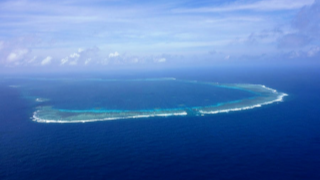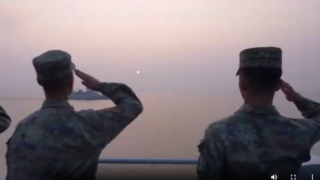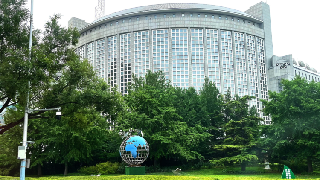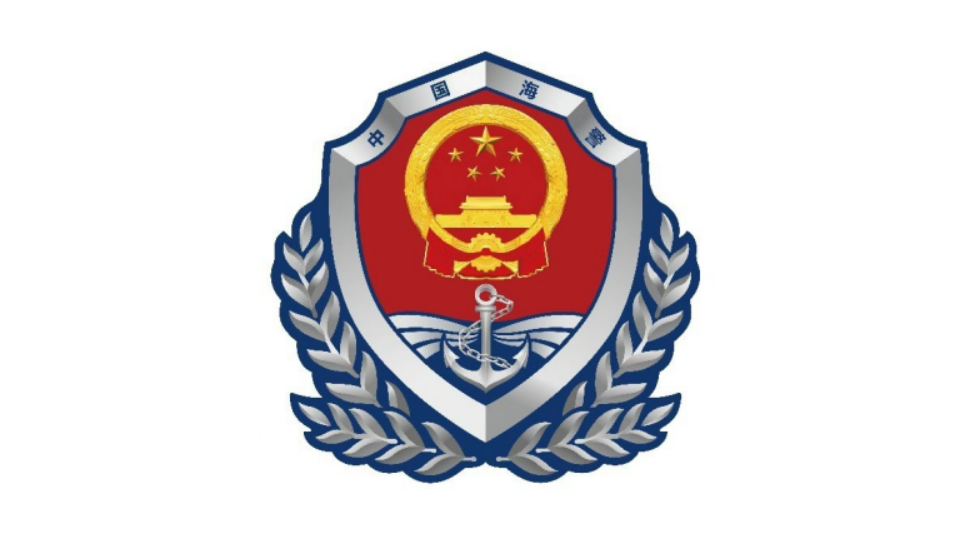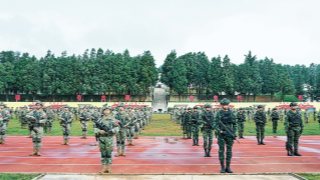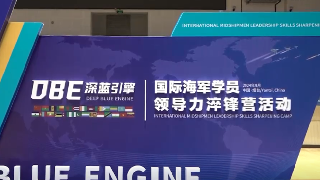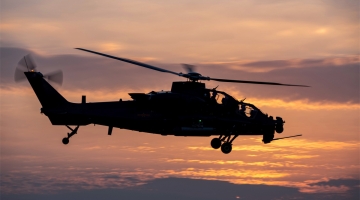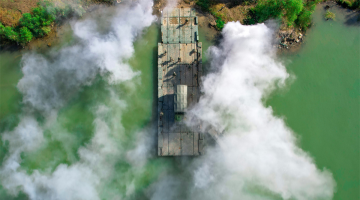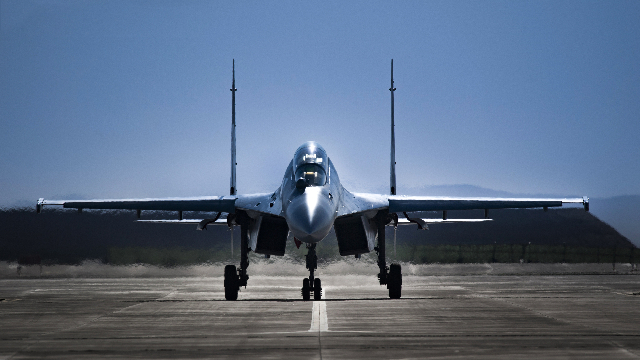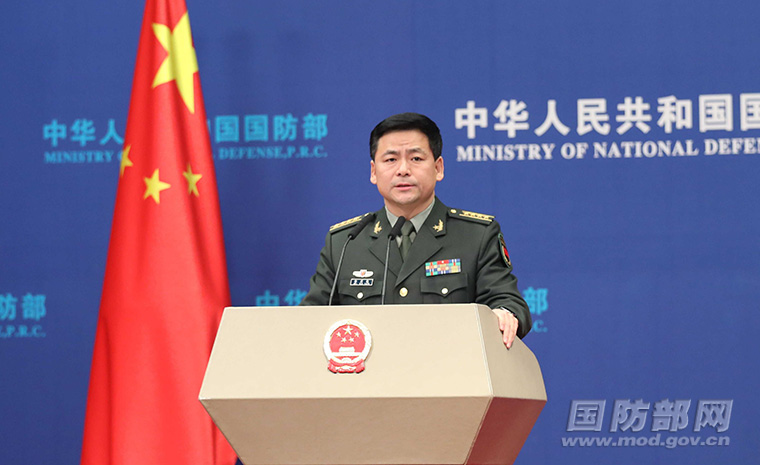
(The following English text of the press conference is for reference. In case of any divergence of interpretation, the Chinese text shall prevail.)
Senior Colonel Ren Guoqiang: At the invitation of the defense ministers of Hungary, Serbia, Greece, and the Republic of North Macedonia, Chinese State Councilor and Defense Minister, General Wei Fenghe set out for a visit to the four countries from March 24 to 31. The visit will further promote the traditional friendship and pragmatic cooperation with the defense departments and militaries of the above-mentioned countries, and advance the healthy and steady development of the mil-to-mil relationships.
Question: President Xi recently attended a plenary meeting of the PLA and PAP delegation to the fourth session of the 13th National People’s Congress (NPC). During the meeting, he stressed that the armed forces must focus on combat readiness, underline innovation-driven development, intensify strategic management, consolidate and develop military-civilian solidarity, and pool a powerful strength for enhancing the development of the nation and the armed forces. What are the military’s arrangements to implement President Xi’s important speech and the spirit of the fourth session of the 13th NPC?
Answer: The fourth session of the 13th NPC is an important meeting held in a year that marks the centenary of the CPC, the first year of the 14th Five-year Plan (2021-2025) period, the outset of the new journey toward building a modern socialist country in all respects, and the start of the new three-step development strategy for modernizing national defense and armed forces. In the afternoon of March 9, President Xi attended the plenary meeting of the PLA and PAP delegation at the fourth session of the 13th NPC and made an important speech. He fully recognized the achievements made in strengthening national defense and the armed forces in the past year, and laid down explicit requirements for ensuring a good start of national defense and military development in the 14th Five-year Plan period.
Recently, the CMC General Office stressed in a circular that the study of the spirit of the NPC session, especially the spirit of President Xi’s important speech, should be included in the agenda of the theoretical study groups of the Party committees in all units at and above regiment level, the ideological and political education of the troops, and the political theory courses in military universities and colleges. Extensive activities such as thematic briefings, discussions and lectures interpreting the hotspots should be carried out to effectively unify the thoughts and actions across the military.
First, as we about to celebrate the centenary of the CPC, we will strengthen the Party’s leadership over the armed forces, enhance party-building, launch the education campaign on CPC history, hold celebrations for the Party’s 100th anniversary, and build new-type military talents.
Second, we will boost military training and preparedness with the focus on capability building in key areas. Steps will be taken to speed up the building of high-caliber strategic deterrence and joint operations systems, advance military training transformation, and improve realistic training.
Third, we will ensure a good start of national defense and military development in the 14th Five-year Plan period, and fulfill the tasks in the military’s annual development plan in a timely and down-to-earth manner for concrete results and effects, so as to contribute greater festivity to the CPC centenary with outstanding achievements.
Question: This year marks the 100th anniversary of the founding of the CPC. President Xi Jinping attended a recent launch meeting of the campaign on Party history learning and education, and delivered an important speech. A few days ago, the CMC issued the Circular on Launching a Campaign of Party History Learning and Education in the Military. What are your arrangements for this campaign?
Answer: In the recent Circular on Launching a Campaign of Party Learning and Education in the Military, the CMC rolls out the overall arrangements for launching a Party learning and education campaign in the military. The Circular highlights the devotion to the Party, the nation, and socialism, emphasizes the Party’s absolute leadership over the people’s military, focuses on the military’s centenary goal, and aims to strengthen the conviction of our officers and soldiers to obey the Party’s order and follow the Party’s lead under the banner of the Party.
First, we will strengthen theoretical studies. The campaign will involve all officers and soldiers. It will be organized by military units at and above regiment level through events such as learning sessions of the theoretical study groups of the Party committees and officer theoretical workshops. And military universities and colleges will highlight relevant contents in their curriculums.
Second, we will offer courses and guidance. The CPC and the Communist Youth League organizations at all levels will hold themed sessions of their semimonthly institutional events on Party history learning and education, put on lectures in the period around July 1, the CPC Founding Day, present microlectures and MOOCs online, and carry out publicity and cultural activities including ceremonies and study tours.
Third, we will deliver thematic briefings. Expert teams will be sent on lecture tours across the military to offer targeted and face-to-face guidance.
Fourth, we will connect learning and education with practice. We will translate the results of the campaign into greater efforts to accomplish our fundamental purpose of serving the people wholeheartedly, effectively fulfill the missions and tasks of the armed forces in the new era, and approach key and tough issues in promoting capabilities and readiness. Measures will be adopted to address the realistic concerns of our service members such as their promotion and career development, family members’ employment, and children’s education. And we will continue to provide active support for economic and social development, consolidate and expand the achievements in poverty alleviation, and brave urgent, difficult, hazardous, and arduous tasks including emergency rescue and disaster relief.
Fifth, we will hold themed discussions. Formal themed discussions in various forms will be held by Party organizations at all levels in their quarterly or semiannual institutional events with a view to encouraging greater dedication to the Party through history learning, experience sharing and honest criticism.
The Circular stressed that units at all levels should view the campaign as a major political task and secure tangible results through effective organization and leadership.
The history of the CPC is the most vivid and convincing textbook. In the modern history of China, there used to be various political parties and organizations. Most of them were wiped out by the tide of history. Why is the CPC the only one capable of undertaking the important task of wining independence and rejuvenation of the Chinese nation? In its early days, the CPC was once short in experience and did not recognize the importance of having its own armed force. In 1927 when the Kuomintang reactionaries betrayed the revolution, a large number of unarmed Party members and revolutionary public were brutally murdered. The CPC learned a hard lesson that it could not defeat the armed reactionaries or lead the revolution in China unless it had an armed force loyal to the revolution. On August 1, 1927, the CPC fired the first shot against the Kuomintang reactionaries in Nanchang. The Nanchang Uprising marked the beginning of the Party’s independent leadership of the revolutionary war, the founding of the people’s military, and the drive to seize state power with military force. Six days after the uprising, the CPC Central Committee held an emergency meeting in Hankou, Hubei province, known as the August 7th Meeting, and identified the Agrarian Revolution and armed resistance to the Kuomintang reactionaries as the overarching policy. This was the right conclusion that the Party reached at the cost of blood. After the meeting, the CPC led a series of armed uprisings such as the Autumn Harvest Uprising and the Guangzhou Uprising, and gradually embarked on the revolutionary path of using rural areas to encircle the cities and seizing state power with military force. The spark of the Chinese revolution spread across the entire country like wildfire. In 1949, 22 years after the Nanchang Uprising, the People’s Republic of China was founded. History has fully proved that there would not be a new China without the CPC. Upholding the Party’s absolute leadership over the people’s military is a distinctive feature of socialism with Chinese characteristics, an important political advantage of the Party and the country, and the foundation for building a strong military. This is a principle not to be altered and a tradition not to be discarded.
Question: According to the Interim National Security Strategic Guidance recently issued by the US National Security Council (NSC), among America’s competitors, China is the only country potentially capable of combining its economic, military, and other power to challenge the current international system. China has been labeled as the “number-one pacing challenge” by the US Department of Defense. US Secretary of Defense Lloyd Austin stated during his visit to Japan and the Republic of Korea that America’s goal is to be able to offer a credible deterrence to China or anybody else who would want to take on the US. At the latest high-level strategic dialogue between China and the US, both sides have agreed to maintain and strengthen communication and coordination on military topics. What’s your comment?
Answer: The remarks by the US side reflect its Cold War mentality. What the US has done is nothing but creating enemies and hyping up threats with the purpose of finding excuses for sustaining hegemony. Those words have manifested in themselves the US side’s obsession on hegemony, pursuit of the law of the jungle, and dangerous misjudgment on China. The Chinese side firmly opposes those remarks as they conform to neither the facts nor the common interests of the two countries and the world.
Though China does not intend to challenge anyone, it is not intimidated by any challenge; though China does not want to threaten anyone, it is not overwhelmed by any threat. China has the right to pursue development, the freedom to choose its own path, the ability to defend itself, and the need to uphold its legitimate rights and interests. No one and no force can stop the Chinese people from striving for a better life. The Chinese military is determined to safeguard China’s sovereignty, security and development interests, and is always capable of achieving that goal.
China is firmly committed to the path of peaceful development, and upholds a national defense policy that is defensive in nature. It has made persistent efforts to promote world peace and development through its own development. The Chinese military has actively developed relationships with its foreign counterparts, participated in global security governance, and continued to provide public security goods such as UN peacekeeping operations, vessel protection operations, and global anti-epidemic supplies, thus making constant contributions to safeguarding national interests, maintaining world peace, and building a community with a shared future for mankind.
It has been proved in the history that hegemonism should have been thrown on the scrap heap. As facts turn out, both China and the US will stand to gain from cooperation and lose from confrontation, and cooperation is the only correct choice for both sides. We hope that the US side can have a clear understanding of the situation, and view the development of China and the Chinese military rationally. We urge the US side to properly handle the relations between the two countries and the two militaries, work with the Chinese side toward the same goal, strengthen dialogue and communication, expand mutually beneficial cooperation, properly manage differences and move forward China-US military relations in a sound and steady manner.
Question: Russia’s Sputnik news agency reported that the International Army Games (IAG) 2021 will be held from late August to early September. Will China be invited to the Games? Will China host some of the events?
Answer: At the invitation of the Ministry of Defense of the Russian Federation , the PLA Army will send teams to Russia from April 4 to 20 to participate in the “Sayan Range March” Snowfield Combat and March Competition, an event within the framework of the IAG. This will be the first time for the Chinese military to compete in this event.
The Chinese side attaches great importance to military training cooperation with foreign militaries and has been taking an active part in the IAG since it was inaugurated. The participation by the Chinese military has played a positive role in deepening the friendship between the Chinese military and the competing counterparts, strengthening exchanges in training, and improving combat capabilities. According to the plan, the Chinese military will compete in a number of events of the IAG abroad and host three important events in China. The Chinese side is currently in close communication with the defense authorities of relevant countries to advance preparations for the upcoming events. We will release relevant information in due time.
Question: Recent donations of COVID-19 vaccines by the Chinese military to some neighboring countries have won positive international comments. However, a few western countries questioned China’s purpose. What’s your comment on that?
Answer: The vaccines are an important means to prevent, control and defeat the pandemic, and a key part of the current international cooperation against COVID-19. Since the outbreak of COVID-19, the Chinese military, guided by the vision of building a community with a shared future for mankind, has provided the international community with support and assistance within its capacity while keeping effective containment measures in place at home. With the approval of the CMC, the PLA has recently provided vaccine assistance to the militaries of countries including Pakistan, Cambodia, Mongolia, and the Philippines. This is a major step taken by the Chinese side to fulfill its international responsibilities and obligations and make the vaccines a global public good. It is not for any geopolitical purpose, and there is no political strings attached. The contributions of the Chinese military have been highly recognized and extensively welcomed by the international community.
As far as we know, governments and military officials of the recipient countries have expressed sincere gratitude to the Chinese side in multiple ways such as letters, telegraphs, diplomatic communications, or public statements. Pakistan’s Chief of Army Staff General Qamar Javed Bajwa sent China a letter to express his gratitude. Lieutenant General Nigar Johar, surgeon general of the Pakistan Army, said the vaccines provided by the Chinese military are right in time and have once again proved that the Pakistan-China friendship is “higher than the mountain, deeper than the sea, and sweeter than the honey”. Cambodian Prime Minister Hun Sen posted a song on social media to hail the true friendship shown in adversity, adding that good friends help each other in times of need. Cambodian Deputy Prime Minister and Defense Minister General Tea Banh has already got inoculated with the COVID-19 vaccines provided by the Chinese military. Cambodian service members said the mutual assistance between the two countries and two militaries has fully demonstrated our iron-clad brotherhood. Philippine President Rodrigo Duterte, together with top military and government officials, welcomed the COVID-19 vaccines from China at the airport and stated his hope to visit China when conditions permit to personally express his sincere gratitude to the Chinese leaders and the Chinese people. Mongolian Defense Minister Gursed Saikhanbayar pointed out that the vaccines provided by the Chinese military not only reflect the deep friendship between the two militaries, but also demonstrate to the world our practical cooperation in fighting the pandemic. The Mongolian people have commented on social media that the 30,000 sheep from Mongolia and the vaccines from China have become the hallmark of bilateral anti-pandemic cooperation, and receiving the vaccines from the PLA is like seeing an oasis after a long trek in the desert.
The assistance to the global fight against the pandemic manifests the Chinese military’s sense of responsibility in the new era. Next, the Chinese military will continue to work with foreign militaries to combat the COVID-19 pandemic, deepen pragmatic cooperation in non-traditional security, and make new contributions to building a community of common health for mankind and maintaining world peace and stability.
Question: It is reported that leaders of Lhasa, capital of Tibet Autonomous Region, led a group to visit sailors onboard the guided-missile destroyer Lhasa in early March. Analysts said it is the official debut of China’s second Type 055 guided-missile destroyer, marking a new height in China’s maritime defense capability. Please brief us on that.
Answer: It is learned that the Type 055 guided-missile destroyer Lhasa, hull number 102, has completed manufacturing and sea trials. She has been commissioned to the PLA Navy on March 2.
This type of ship is a 10,000-ton-class destroyer independently developed by China, which marks a milestone in the PLA Navy’s strategic transformation and development with key technological breakthroughs in overall design, information integration and final assembly of large vessels. Equipped with new weapons for air defense, anti-missile, anti-ship and anti-submarine, the Type 055 destroyer boasts strong capabilities in information awareness, air and missile defense, and anti-ship strike. It will help the PLA Navy better perform its sacred mission of safeguarding national sovereignty, security and development interests, and upholding world peace, stability and prosperity.
Question: We noticed that the CMC recently issued the Decision on Fostering a New-Type Military Training System. The Decision emphasized the efforts to comprehensively improve military training and enhance the capability to win wars. Could you please brief us on the specific ideas and measures of the military to implement the Decision?
Answer: With the approval of President Xi Jinping, the CMC has recently issued the Decision on Fostering a New-Type Military Training System (Hereinafter referred to as the Decision). The Decision, focusing on the transformation and development of military training, puts forward the overall requirements for military training in the new era, and plans out the goals and major measures for building a new-type military training system.
All military units will conscientiously act on President Xi’s important instructions on military training, learn from powerful adversaries, focus on combat capabilities and readiness, and speed up the implementation of the Decision, so as to build a new-type military training system that is compatible with the world-class military.
First, we will be combat-oriented. The military should bear combat readiness in mind, take combat effectiveness as criterion, and set up practical targets. Efforts will be made to tailor training programs to fit the needs to prevail over strong adversaries, combat tasks and future wars. We will conduct training under real-combat conditions and promote combat capabilities through training. And this is what we will implement across all fields and in the whole process in building the military training system.
Second, we will reinforce the effectiveness of military training. The military should strengthen the study on wars and warfare, integrate confrontation into training at strategic, operational and tactical levels, systematically promote the construction of training venues and the development of mock adversary forces, conduct strict oversight and supervision in military training, and continue to uproot peacetime ills.
Third, we will strive for new breakthroughs. The military should innovate in training methods, strengthen systematic military training based on joint operations and training, intensify high-tech training by applying information and AI technologies, and build a law-based, highly-efficient new training pattern with fine management.
Fourth, we will put more theories into practice. The military should translate the major ideas and measures specified in the Decision into concrete goals, road maps and implementation plans for military training development, formulate a system of standards for quantitative evaluation, facilitate exchanges of combat training experience across the armed forces, improve the mechanism for transforming and utilizing military training achievements, and explore new ways to share the results.
Question: It is reported that a certain NATO member states have recently dispatched or announced to dispatch warships to the South China Sea for the so-called Freedom of Navigation Operations. French Defense Minister said two French naval vessels had recently finished their patrols in the South China Sea. A German official said Berlin plans to send warships to visit Asia in August this year, which will pass through the South China Sea on their way back, but will not enter the 12-nautical-mile range of the disputed waters. The UK also announced that it will send the aircraft carrier Queen Elizabeth to the South China Sea within the year. Please comment on that.
Answer: We are following the development of the situation closely. At present, thanks to the concerted efforts of regional countries, the situation in the South China Sea remains generally stable. And freedom of navigation has never been an issue in the region. Countries in the region and the international community are fully aware that the security risks in the South China Sea mainly come from outside of the region. We hope relevant countries can make more constructive efforts to maintain regional peace and stability, instead of making troubles.
Today’s China is not what it used to be a hundred years ago, nor is the world anything like the one from a century ago. China always respects the freedom of navigation and overflight enjoyed by all countries in the South China Sea in accordance with international law, but strongly opposes any attempt to take it as an excuse and harm the sovereignty and security of littoral countries. The world is undergoing profound changes unseen in a century. We hope relevant countries fully recognize the trend of our times for peace, development and win-win cooperation, protect common interests through extensive consultation, joint contribution and shared benefits, and work together to maintain regional and global peace, stability and prosperity.
Question: According to the Hindustan Times’ reports, the spokesperson for the Ministry of External Affairs of India urged China to complete its military withdrawal at the remaining friction points of the so-called “Ladakh” line of actual control (LAC). The Indian side looks forward to cooperating with China through such means as the Working Mechanism for Consultation and Coordination on Border Affairs and the China-India Corps Commander Level meetings, to complete disengagement of troops as soon as possible in the remaining regions. What is China’s comment on this?
Answer: At present, Chinese and Indian front-line troops have disengaged in Pangong Lake area. Both sides have made positive comments on the critical progress and agreed to maintain communication through military and diplomatic channels so as to promote the resolution of other issues in the western section of China-India boundary.
Thanks to the joint efforts made by the Chinese and Indian sides, the tension in the border areas has been eased distinctly. We hope that the two sides can value the hard-won results, follow the important consensus reached by the leaders of both countries, maintain dialogue and communication, stabilize the situation against relapse, gradually come to solutions that can be accepted by both sides, and jointly maintain peace in the border areas.
Question: Recently the US, Japan, India and Australia held their first “Quad” Summit and released a joint statement. Jake Sullivan, National Security Advisor to US President, said that leaders of the four countries discussed the “challenge” posed by China during the summit, and they made clear that none of them have any “illusion” about China. Some comment that the US is trying to form an Indo-Pacific version of NATO to confront China. Please comment on that.
Answer: The US-led “Quad” mechanism is entrenched in the Cold War mentality, advocates bloc confrontation and is obsessed with geopolitical gaming. The countries are ganging up on the pretext of the so-called “China challenge” and blatantly stirring up troubles among regional countries. We are firmly opposed to that.
Seeking peace, development, and win-win cooperation is the trend of the times. Any behavior against this trend to meet one’s selfish interests is outdated, unpopular and doomed to fail. China is committed to being a builder of world peace, a contributor to global development, and a defender of international order. We urge the US side to truly live up to its responsibilities, stop sowing discord and making troubles out of nothing, and do more to contribute to regional peace and stability.
Question: It is reported that US Navy Adm. Philip Davidson claimed that the Chinese mainland could settle the Taiwan question within six years and supplant the US’s leadership by 2050. Adm. John Aquilino, nominated to become commander of the US Indo-Pacific Command, said the biggest concern in the Indo-Pacific region was a military takeover of Taiwan by the Chinese mainland. What’s your comment on that?
Answer: There is only one China in the world. Taiwan is an inalienable part of the Chinese territory. The Taiwan question is China’s internal affair, which brooks no outside interference. The great rejuvenation of the Chinese nation and complete reunification of the two sides of the Taiwan Strait are inevitable. Any attempt by external forces to “contain China with the Taiwan question” or by “Taiwan independence” forces to seek “independence by force” will be a dead end.
The one-China principle is the political foundation for China-US relations. We urge the US side to abide by the one-China principle and the provisions of the three China-US joint communiqués, and properly handle the Taiwan question. We resolutely oppose the US side hyping the so-called “military threats from China”. The US side should abandon its zero-sum mindset, view China’s national and defense development in an objective and rational way, and do more to promote mutual trust between the two countries and contribute to regional peace and stability.
Question: The website of US Department of Defense recently published an article on the situation in the Indo-Pacific region, in which the expression of so-called “Taiwan was never part of China” appeared. Please comment on that.
Answer: The expression by the US side seriously breached the one-China principle and sent a wrong message to the “Taiwan independence” separatists. Such expression is egregious. China is strongly dissatisfied with and firmly opposed to that.
The historical and legal facts that Taiwan is a part of China and both sides across the Taiwan Strait belong to one China can never be altered by anyone or any force. The Taiwan question is purely an internal affair of China. It bears on China’s core interests and brooks no outside forces’ interference in any form. The PLA is determined to safeguard national sovereignty, security and development interests.
The Chinese side urges the US side to abide by the one-China principle and the provisions of the three China-US Joint Communiqués, and prudently and properly handle the Taiwan question, so as to avoid severe damage to the relations between the two countries and militaries and further jeopardizing the peace and stability across the Taiwan Strait.
Question: Recently the illegal comments made online by Weibo user Labixiaoqiu and the one surnamed Pan that denigrated the martyrs who died defending Chinese border have brought about a severe negative social impact. Please comment on that.
Answer: Martyrs should never be blasphemed and the law brooks no challenge. Heroic martyrs are the backbone of a country and a nation. Only when we respect, admire and strive to be heroes, will there be more heroes coming forward. We must hold heroes in high esteem, learn from them, defend them, and care for them. Any act of slandering heroes will be severely punished by law.

